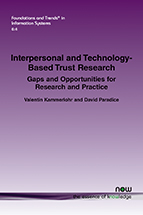Interpersonal and Technology-Based Trust Research: Gaps and Opportunities for Research and Practice
By Valentin Kammerlohr, Harbert College of Business, Auburn University, USA | David Paradice, Harbert College of Business, Auburn University, USA, dbp0011@auburn.edu
Abstract
Trust is something we encounter every day in our personal lives, but it becomes increasingly important in technology-based transactions because traditional interpersonal trust factors cannot be applied as usual. The last “special issue” on trust in the IS research literature appeared in 2008. Given the lead time associated with published research, the studies that were reported in that special issue occurred just prior to the introduction of the first iPhone, when Facebook was in its infancy, and several years prior to the introduction of digital currency or AI-based assistants such as Siri and Alexa. Much has changed since then. A comprehensive review of trust research, from both a non-technology and a technology perspective, provides an opportunity to identify gaps and opportunities for research and practice. Because trust is a very complex construct, we first review the term, the boundaries between it and IT trust, and the history of non-technology-based trust. This review is organized in the context of personal, professional, and organizational relationships, looking at initial trust and the long-term evolution of trust. Next, an overview of existing technology-based trust studies published in MIS Quarterly, Information Systems Research, and other IS research outlets is provided. Finally, we identify where research and practical gaps and opportunities exist for future technology-based trust studies by balancing acquired and practical relevance.
Interpersonal and Technology-Based Trust Research: Gaps and Opportunities for Research and Practice
We encounter trust every day in our lives but it becomes increasingly important in technology-based transactions as traditional interpersonal trust factors cannot be applied as usual. As technology becomes more and more ubiquitous in our lives, we need to understand how trust in technology contexts is created, maintained, destroyed, and possibly rebuilt. This knowledge is important for the developers of technology, to create successful use, and for the users of technology, to be aware of the vulnerabilities and potential risks of technology use.
This monograph examines the rich history of trust research outside of a technology context to assess existing trust studies in technology contexts and to inform the design and execution of future trust research in technology contexts. Because trust is a very complex construct, the authors first review the term. The rest of the review is organized in the context of personal, professional, and organizational relationships, looking at initial trust and the long-term evolution of trust. An overview of existing technology-based trust studies published in MIS Quarterly, Information Systems Research, and other Information Systems research outlets is provided. Finally, the authors identify where research and practical gaps and opportunities exist for future technology-based trust studies by balancing acquired and practical relevance.
